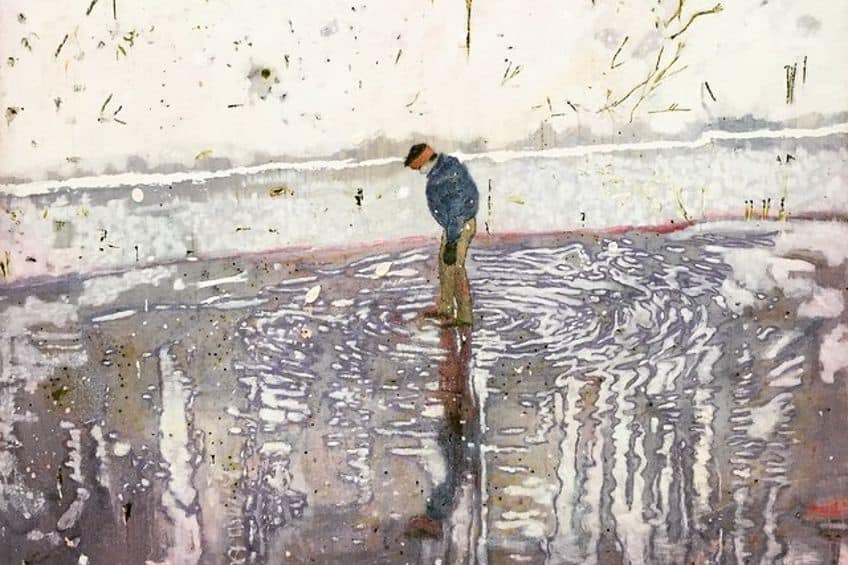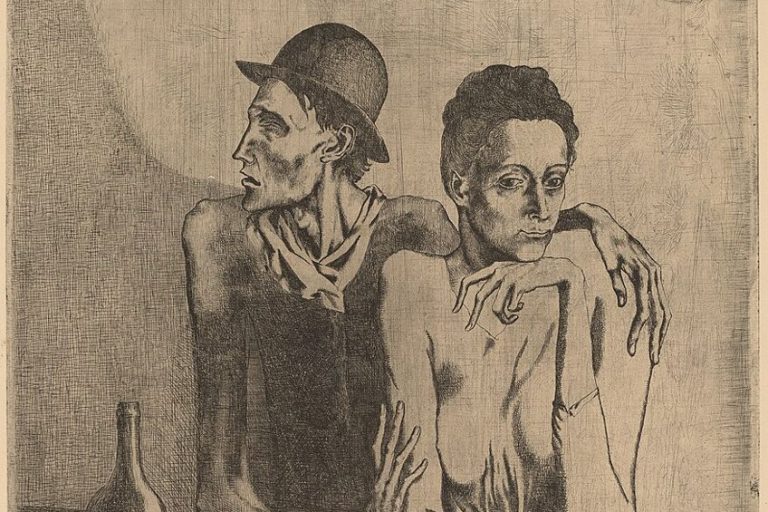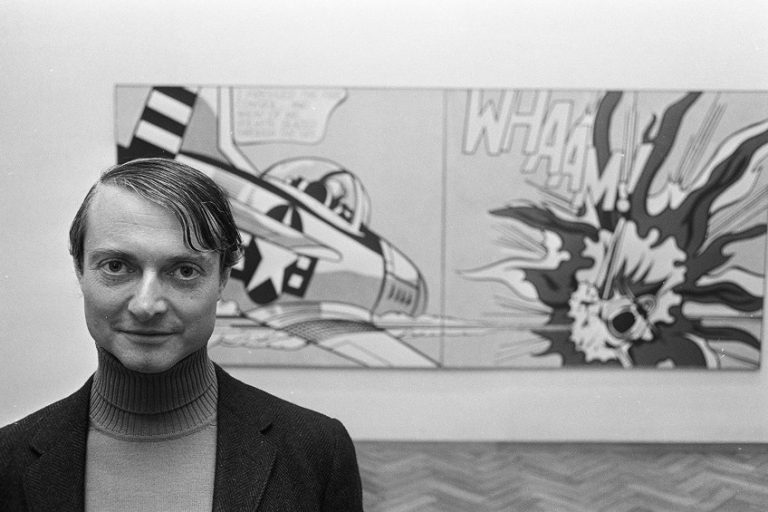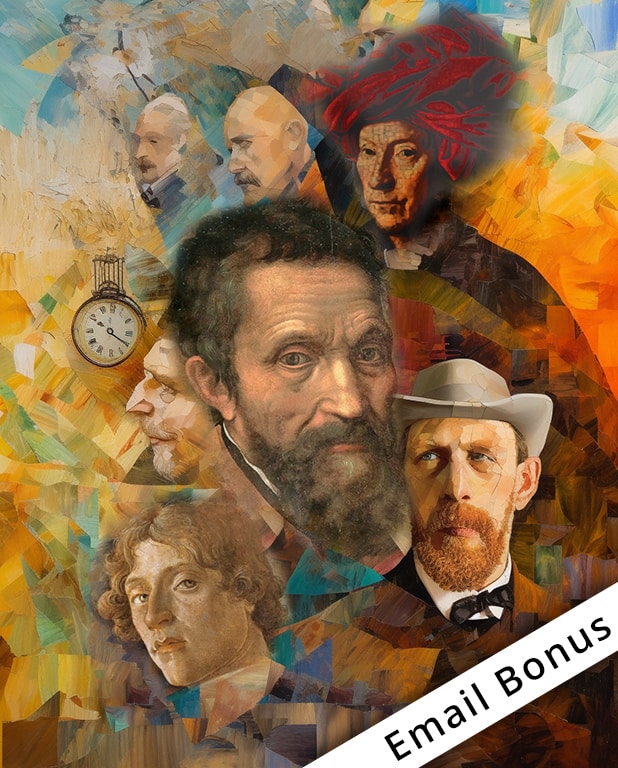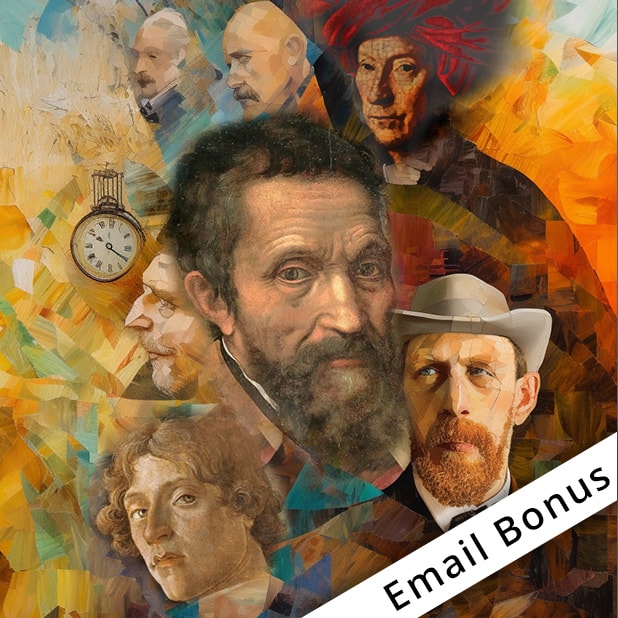Peter Doig – Dreamlike Contemporary Landscapes
Peter Doig is a renowned contemporary artist whose work often blurs the boundaries between reality and imagination, inviting viewers into dreamlike landscapes rich with symbolism and emotion. Born in Edinburgh in 1959 and raised in Canada, Doig’s diverse background influences his art, which ranges from hauntingly beautiful scenes of nature to vibrant, expressive portraits. His distinctive style, characterized by bold colors and a masterful use of light and shadow, has earned him international acclaim and a prominent place in the contemporary art world.
Key Takeaways
- Peter Doig is a pivotal contributor to contemporary art, celebrated for reinventing painting.
- He draws upon personal memories and cultural histories to inform his figurative and abstract works.
- Doig’s art has been critically acclaimed, reflected in exceptional achievements and recognition in the art world.
Early Life and Education
| Birth | April 17, 1959 |
| Death | Present |
| Place of Birth | Edinburgh, Scotland, United Kingdom |
| Genre of Work | Painting |
Peter Doig stands as one of the most significant figures in contemporary art, particularly renowned for his influence on the medium of painting. Born in Scotland, he spent his early childhood in Trinidad before moving to Canada, where he would later draw inspiration from its landscapes and culture. Doig’s approach to painting, characterized by its blend of figuration and abstraction, mirrors the complexity of memory and perception, earning him international acclaim. His works often depict landscapes that are at once familiar and mysterious, inviting viewers to navigate through layers of imagery and meaning.

Doig’s career trajectory took a definitive turn when his piece, White Canoe, sold in 2007 at a record-breaking price for a living European artist at the time. This milestone at Sotheby’s established his significant place in the art market and underscored the critical reception of his work. Since settling in Trinidad in 2002, his art has continued to evolve, incorporating influences from the island’s history and environment.
Despite this geographical shift, Doig has maintained his reputation as a meticulous colorist whose canvases invite viewers to contemplate the potent intersection between reality and artifice.
Beginnings and Influences
Born in Edinburgh in 1959, Peter Doig moved to Trinidad with his family when he was quite young. The vibrancy and landscapes of Trinidad left a lasting impression on him and later permeated his artwork. At the age of seven, his family relocated to Canada, where he spent his childhood immersed in the diverse North American culture.

Formal Art Education
Doig returned to London to further his passion for painting. He received his formal art education at the Wimbledon School of Art, followed by Saint Martin’s School of Art, and eventually at the Chelsea School of Art.
These institutions are known for fostering creativity and critical thinking, honing Doig’s skills and helping him develop his distinctive approach to landscape painting.
Career and Artistic Style
Peter Doig is recognized for his significant contributions to contemporary art, particularly in the revival of painting as a vital and modern form of expression. His work navigates the spaces between reality and imagination, informed by personal experiences and references to film, art history, and diverse landscapes.
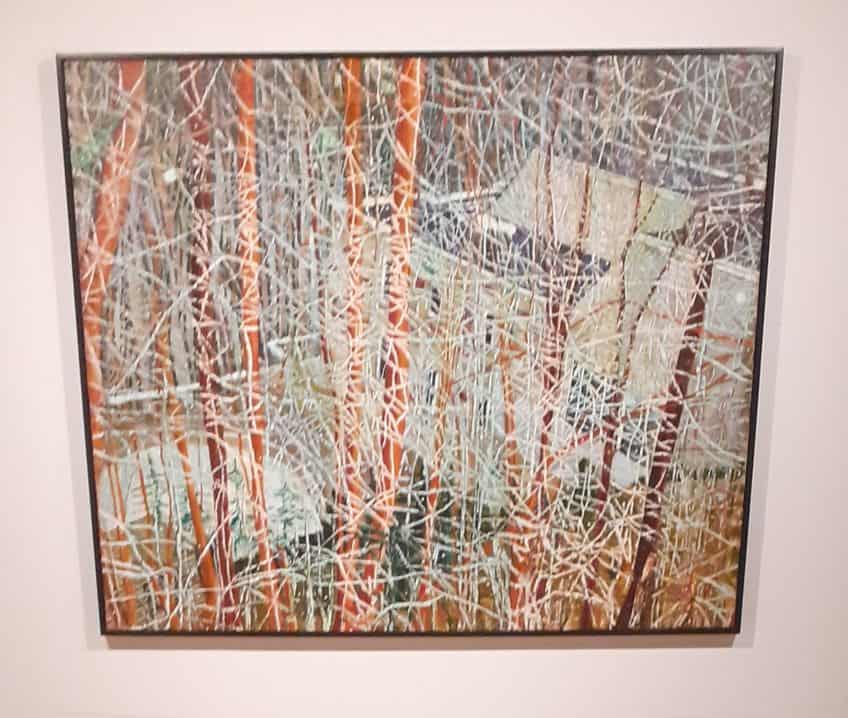
Evolution of Painting Style
Doig’s painting style has undergone notable developments, transitioning from abstract compositions in his early days to more figurative approaches. His time in Canada influenced his frequent depiction of snowy scenes and landscapes, often using a photorealist style.
The technique evolved with the introduction of a richer palette and a distinctive approach that bridges the gap between realism and the dreamlike qualities of imagination.
Themes and Subject Matter
His subject matter often includes landscapes, both abstract and figurative, with an undercurrent of narrative and magic. His early works are reminiscent of the style of Edvard Munch, encompassing a haunting and evocative aesthetic. Film and photography stand out as strong influences in Doig’s themes, evident in many of his works which could be mistaken for stills from a movie.

Significant Artworks
- The Architect’s Home in the Ravine (1991): Shows the fine balance Doig achieves between natural landscape and architectural form, rendered in his characteristic photorealist technique.
- White Canoe (1993): An oil on canvas that became one of the most acclaimed works by Doig when it set an auction record for a living European artist.
Current Career
After settling in Trinidad, Doig has continued to produce art that reflects his vast experiences from different parts of the world. His creativity remains at the forefront of modern art, maintaining a consistent presence in international galleries.
Whether through landscapes or the abstract, his works underscore his status as a leading artist who continually challenges and expands the boundaries of contemporary painting.
Critical Reception and Achievements
Peter Doig has established himself as a prominent painter, earning both critical acclaim and commercial success. His works, celebrated for their narrative richness and captivating use of color, have fetched impressive sums at major auction houses, while the art community recognizes his contributions with numerous accolades.

Art Market Success
Doig’s paintings are highly valued in the art market. A key milestone was reached in a London auction when his painting, White Canoe, sold at Sotheby’s for $11.3 million, setting an auction record for a European living artist at that time. This was later eclipsed by another of his works, which sold for approximately $12 million.
His strong performance at these auctions signifies his high status within contemporary art circles.
Awards and Recognition
Doig has been the recipient of the prestigious Whitechapel Artist Prize, which further solidified his position in the art community. While he has never won the Turner Prize, his nomination alone speaks volumes of his talent and the respect he commands among critics and peers. His mid-career retrospective at the Tate Gallery was widely admired, with art critic Jonathan Jones praising the exhibition. Although he faced criticism early in his career, the overall positive reception and subsequent success underscore the art world’s esteem for his work.

Influence and Contributions
Peter Doig stands as a beacon in the world of modern art, renowned for his distinct approach to landscape paintings and his ability to foster collaborative environments among contemporary artists. His career reflects a profound influence on peers and the broader scope of art, often blending reality with dream-like surrealism.

Contemporary Collaborations
Among his professional affiliations, Peter Doig is known to collaborate with fellow artist Chris Ofili. They share a connection to Trinidad; a locale that influences their artistic vision. At the Caribbean Contemporary Arts Centre, Doig also makes significant contributions through an artist’s residency program, shaping the perspectives and skills of emerging artists.
This engagement reflects his commitment to the development of contemporary Caribbean art and his influence on artists who are working at the intersection of cultural identities and global art trends.
Impact on Modern Art
Peter Doig’s work, often reflecting a profound connection with landscapes, has reshaped modern art’s appreciation for both subject matter and technique. His paintings are known for transporting viewers to settings that are at once eerily familiar and intriguingly novel. Doig plays a role in modern art by creating an intersection of reality and imagination, prompting a dialogue on perception and artistic portrayal. Additionally, his transformative influence extends to the English National Opera, where he contributed as a set designer, intermingling visual arts with performing arts. He has also co-founded the studiofilmclub in Trinidad, a place for cinephiles and artists alike to engage with film as a creative medium.
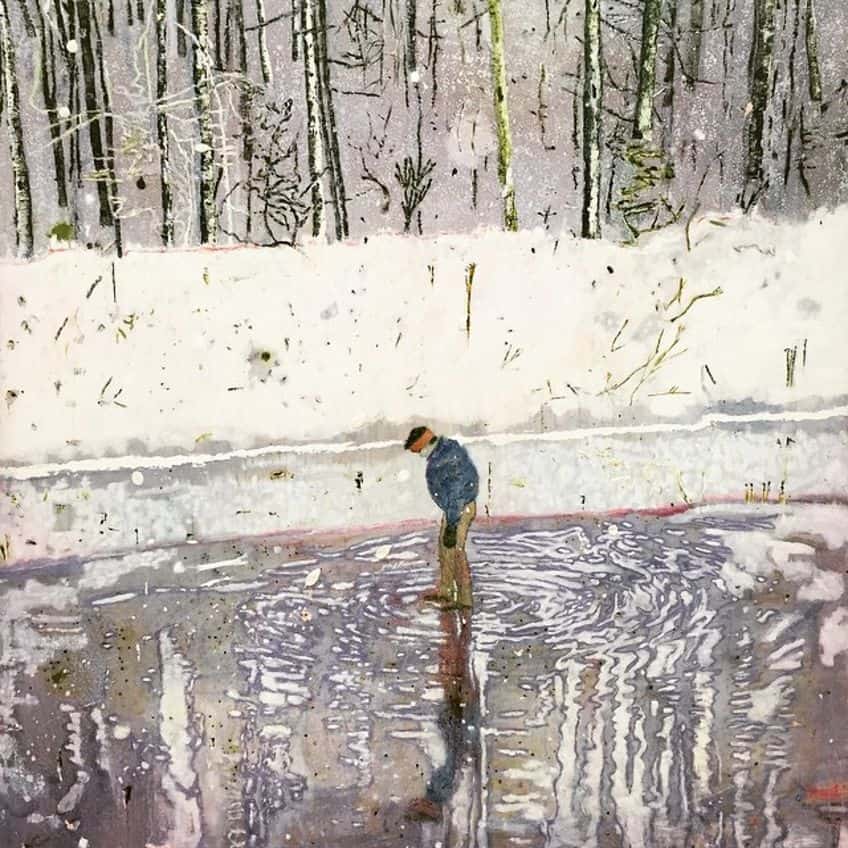
Peter Doig’s artistic journey is a testament to the power of imagination and the evocative nature of art. His ability to transport viewers into surreal yet deeply resonant worlds, combined with his technical prowess and unique vision, cements his status as a leading figure in contemporary art. With each brushstroke, Doig invites us to explore the depths of our own imaginations and emotions, leaving a lasting impact on the art world and inspiring generations of artists to come.
Frequently Asked Questions
What Are the Notable Influences on Peter Doig’s Paintings?
Peter Doig’s paintings reflect a synthesis of varied influences, from his personal memories to the landscapes he has experienced. He integrates elements from different sources such as literature, film, and other artworks, creating a diverse tapestry that informs his unique visual language.
How Has Peter Doig’s Style Evolved Throughout His Career?
Throughout his career, Peter Doig has maintained a distinct aesthetic while allowing his style to evolve. He is known for his vibrant and dreamlike landscapes which merge reality with fantasy. His approach to color and texture has developed over time, reinforcing his status as a significant figure in contemporary art.
What Distinguishes Peter Doig’s Approach to Landscape Painting?
Doig’s landscapes are often characterized by a tension between a generic portrayal of pastoral scenes and a deep personal connection to the environment. This duality is a hallmark of his work, distinguishing his approach to landscape painting from that of his contemporaries.
Isabella studied at the University of Cape Town in South Africa and graduated with a Bachelor of Arts majoring in English Literature & Language and Psychology. Throughout her undergraduate years, she took Art History as an additional subject and absolutely loved it. Building on from her art history knowledge that began in high school, art has always been a particular area of fascination for her. From learning about artworks previously unknown to her, or sharpening her existing understanding of specific works, the ability to continue learning within this interesting sphere excites her greatly.
Her focal points of interest in art history encompass profiling specific artists and art movements, as it is these areas where she is able to really dig deep into the rich narrative of the art world. Additionally, she particularly enjoys exploring the different artistic styles of the 20th century, as well as the important impact that female artists have had on the development of art history.
Learn more about Isabella Meyer and the Art in Context Team.
Cite this Article
Isabella, Meyer, “Peter Doig – Dreamlike Contemporary Landscapes.” Art in Context. May 17, 2024. URL: https://artincontext.org/peter-doig/
Meyer, I. (2024, 17 May). Peter Doig – Dreamlike Contemporary Landscapes. Art in Context. https://artincontext.org/peter-doig/
Meyer, Isabella. “Peter Doig – Dreamlike Contemporary Landscapes.” Art in Context, May 17, 2024. https://artincontext.org/peter-doig/.


